Sian Davey has more reason than most to be tired. Her latest photoseries, Together, which is about to launch as part of a popup exhibition, We Are Family, at the National Portrait Gallery, has seen the photographer shoot 35 families across the UK in the space of just 21 days.
From the south of England to islands of the Outer Hebrides, the series considers the meaning of the word family, showing the diversity of the modern family unit. Contextualised by dinnertimes, Davey’s series shows how sharing meals creates occasions for support and togetherness, wherever they appear.
“There’s no longer a traditional family, for many reasons. ‘Family’ has changed meaning. It’s been disrupted by what’s going on in the labour market, new technology, people doing split shifts, and not eating together,” explains Davey as she reflects on the new series.
Even so Davey, who is renown for her photographs of her own family, tried to find a unifying thread as she worked. “Actually, what I experienced and witnessed in most families was a really strong sense of well-being and love towards each other, because it’s tough out there,” she says.
Unconventional families are part of Davey’s make-up. She left her own family when she was still a teenager and is a mother to four children between the ages of six and 30. Her youngest child, Alice, the inspiration for her series Looking for Alice, has Down’s Syndrome. Consequently, she has found that her process of photographing families helps her to “metabolise life”. Ultimately, Davey wanted to create a project that celebrates family life in its unpredictable complexity.
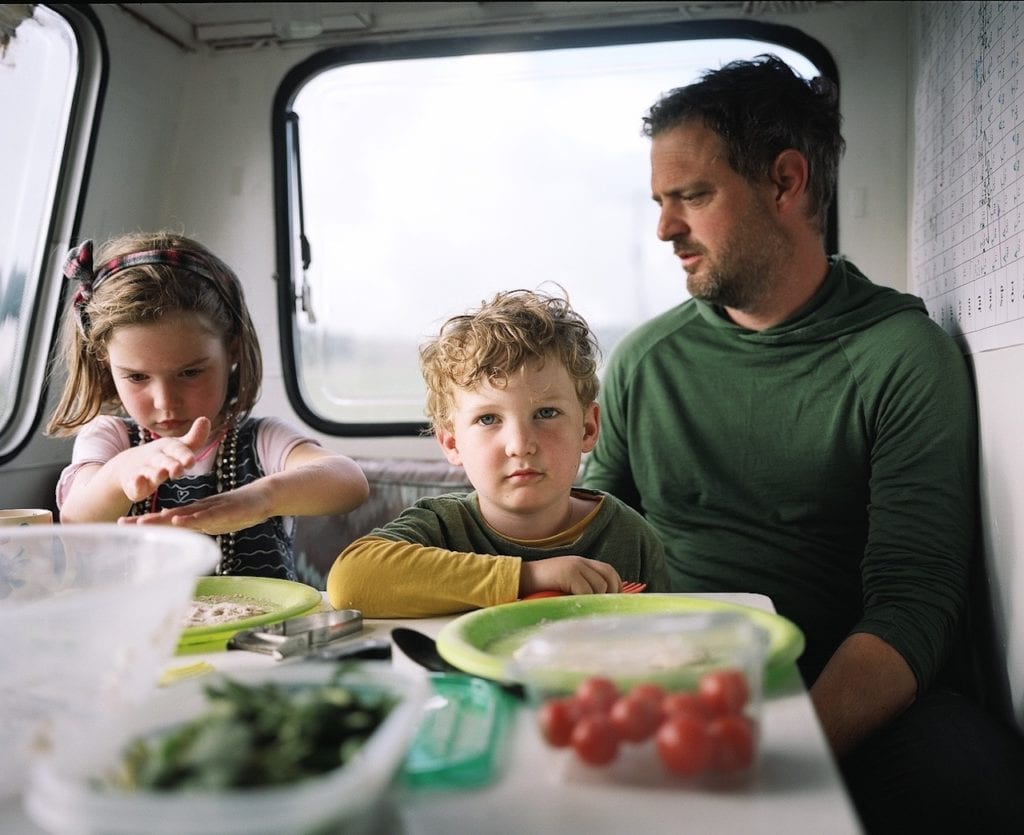 Tom Chadwick, father of Roo and Peter Chadwick – Totnes, Devon. Tom decided to buy an old caravan and rent out his home for the summer. For ten pounds a night, he lives with Roo, six, and Peter, four, in a caravan on a farm near the south Devon coast at Bigbury-on-Sea. They eat home-made bread on a rug on the grass before walking to the brow of the hill for the sunset. “You can’t choose your family,” he says. “They are given to you.” © Sian Davey, text Tom Seymour
Tom Chadwick, father of Roo and Peter Chadwick – Totnes, Devon. Tom decided to buy an old caravan and rent out his home for the summer. For ten pounds a night, he lives with Roo, six, and Peter, four, in a caravan on a farm near the south Devon coast at Bigbury-on-Sea. They eat home-made bread on a rug on the grass before walking to the brow of the hill for the sunset. “You can’t choose your family,” he says. “They are given to you.” © Sian Davey, text Tom Seymour
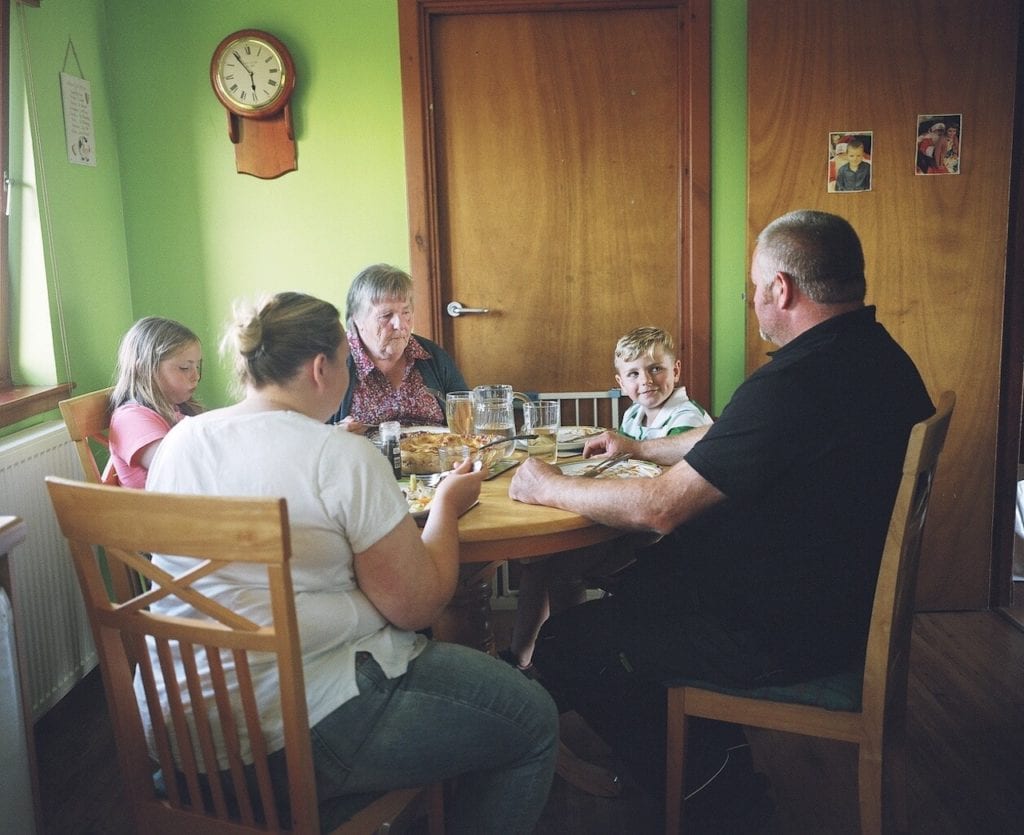 Amelia, Catherine (facing away), Catherine Flora, Niall and Iain Morrison – South Uist, Outer Hebrides. The Morrison family are crofters. Iain’s ancestors survived by living off the “machai” – the island’s salty peat. “It’s a way of life,” he says. “It’s something you’re born with.” In the spring months, seals bask on the beaches near their kitchen window. If you get the ferry from Uist to the mainland, dolphins chase the bow of the ship. The body of a mermaid, discovered in 1830, is buried near the coast. The family own a herd of Highland cows. They’re wild, dangerous creatures, but Niall has fed them from hand ever since he was small. Kate says: “We are here to nurture Niall and Amelia. They can either go out into the wider world, or work the land we will hand over to them.” © Sian Davey, text Tom Seymour
Amelia, Catherine (facing away), Catherine Flora, Niall and Iain Morrison – South Uist, Outer Hebrides. The Morrison family are crofters. Iain’s ancestors survived by living off the “machai” – the island’s salty peat. “It’s a way of life,” he says. “It’s something you’re born with.” In the spring months, seals bask on the beaches near their kitchen window. If you get the ferry from Uist to the mainland, dolphins chase the bow of the ship. The body of a mermaid, discovered in 1830, is buried near the coast. The family own a herd of Highland cows. They’re wild, dangerous creatures, but Niall has fed them from hand ever since he was small. Kate says: “We are here to nurture Niall and Amelia. They can either go out into the wider world, or work the land we will hand over to them.” © Sian Davey, text Tom Seymour
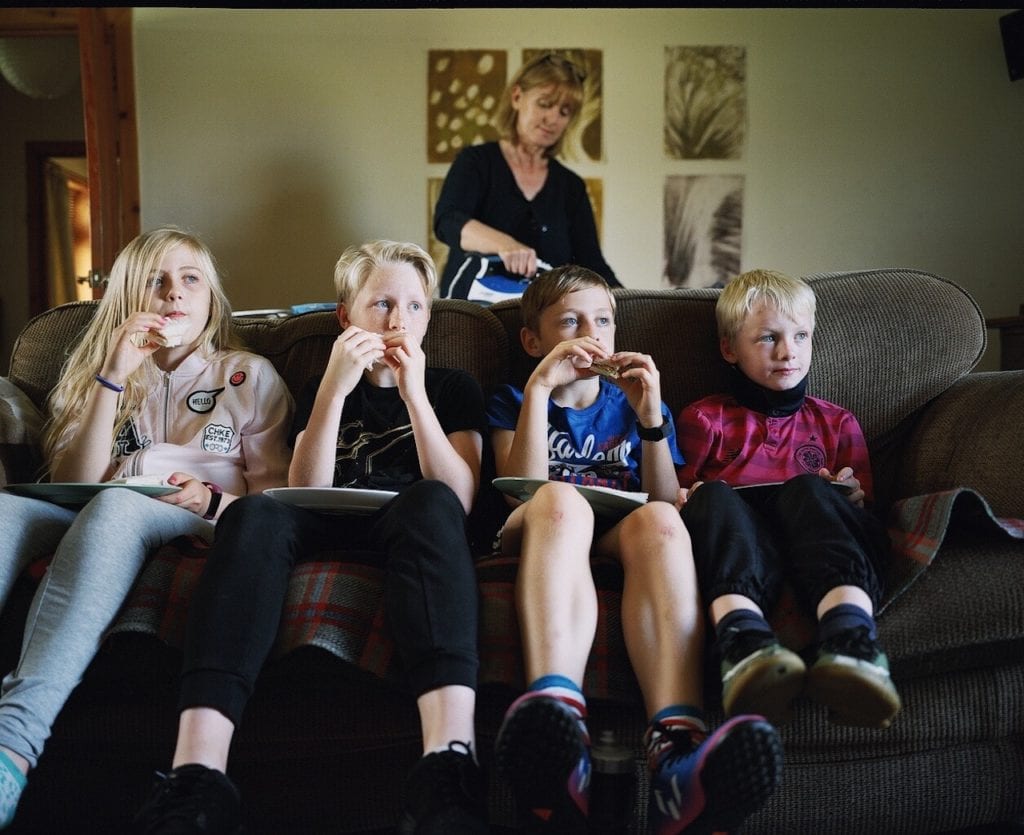 Kate Walker, Sean Campbell, Mary Walker (ironing), Angus Walker and James Campbell – South Uist, Outer Hebrides. Mary and Donald met at a dance in the Creagorry Hotel. He built this house from the ground up, from the croft he inherited from his father. They have raised six children. Muddy shoes are scattered on the floor, clothes lie in heaps, the youngest run from room to room. The oldest brother, Peter, has just left the island for university in London. Niall, 17, works in the fisheries, and will spend a morning driving a quad bike to the top of the distant mountains. There’s no walls or gates on the island, nothing to stop the kids from roaming as far as they want. They don’t have wifi. If it rains, they carry on playing. Their welcome extends to anyone who passes their door. “We are there for each other, and we help each other grow,“ Mary says. “When my children go into the world on their own, I hope they will treat all they come across with kindness and respect.” © Sian Davey, text Tom Seymour
“When I was 18, I left my family and I never went back. So I’m not romanticising family,” says Davey. “It was so difficult for me that I just had to get away, to the point that I didn’t go back. My friends became my family. I could never generate what it meant to have a family where it was completely unconditional and you could really lean into them. So I was very careful in this project not to romanticise family.”
Kate Walker, Sean Campbell, Mary Walker (ironing), Angus Walker and James Campbell – South Uist, Outer Hebrides. Mary and Donald met at a dance in the Creagorry Hotel. He built this house from the ground up, from the croft he inherited from his father. They have raised six children. Muddy shoes are scattered on the floor, clothes lie in heaps, the youngest run from room to room. The oldest brother, Peter, has just left the island for university in London. Niall, 17, works in the fisheries, and will spend a morning driving a quad bike to the top of the distant mountains. There’s no walls or gates on the island, nothing to stop the kids from roaming as far as they want. They don’t have wifi. If it rains, they carry on playing. Their welcome extends to anyone who passes their door. “We are there for each other, and we help each other grow,“ Mary says. “When my children go into the world on their own, I hope they will treat all they come across with kindness and respect.” © Sian Davey, text Tom Seymour
“When I was 18, I left my family and I never went back. So I’m not romanticising family,” says Davey. “It was so difficult for me that I just had to get away, to the point that I didn’t go back. My friends became my family. I could never generate what it meant to have a family where it was completely unconditional and you could really lean into them. So I was very careful in this project not to romanticise family.”
Together brings the private and often intimate experience of sharing a family meal into the public sphere: this is usually a time reserved for conversations and relationships away from prying eyes. Training and working as a psychotherapist before turning her hand to photography, says she is used to navigating family lives, and spent three to four hours in each home.
“I’m very fearless when I’m in there. Nothing really phases me. There was no one to be nervous or anxious about. That was my attitude when I went in. It only occurred to me half way through the project. I thought ‘Oh my god, I never know anyone who I’m working with and I throw myself in the middle of it all and by the time I left I was a member of their family.’”
The series captures a wide variety of family mealtimes, some in which the traditional dining table still features but others in which eschewed in favour of other environments. One family with a young baby tends to eat in the bedroom, as it’s easier to hold the newborn and eat that way; another has meals on the grass in front of the family caravan every evening; a third family sits on the floor of their living room, as is part of their cultural heritage.
The photographs feature teenage families, asylum seekers, single mothers and fathers and multicultural families, each accompanied by a small interview extract from writer and producer, Tom Seymour, who toured the country with Davey.
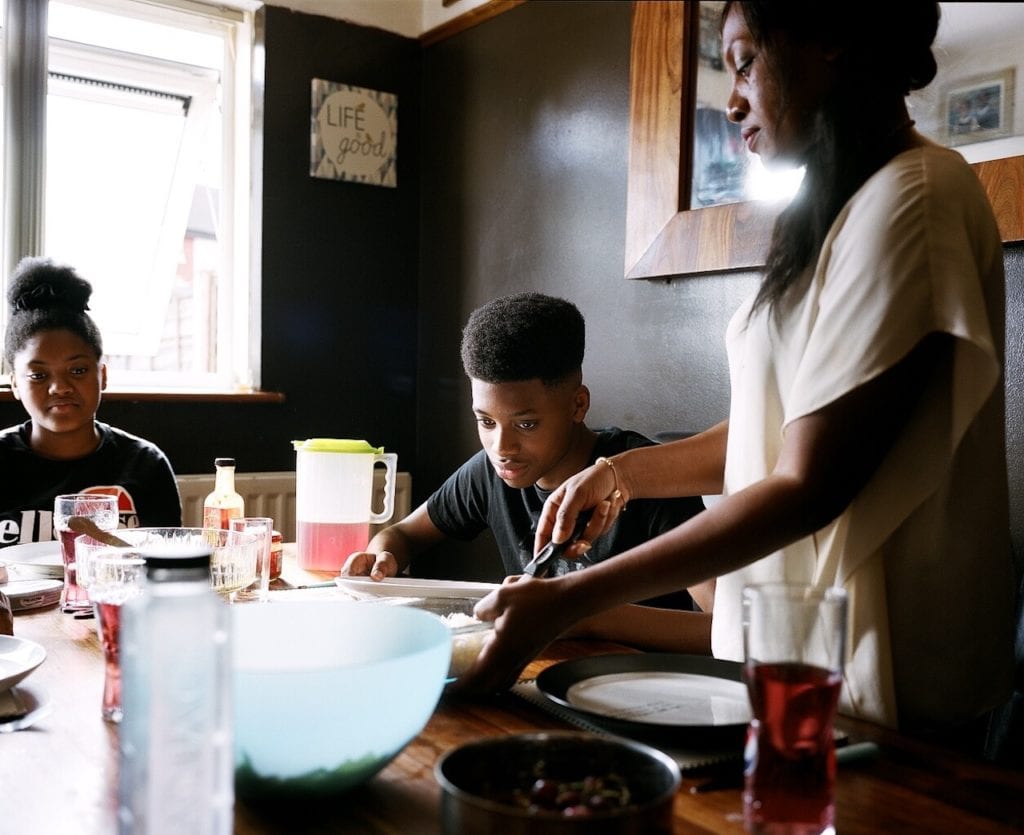 Denise Christopher, with Corey Christopher, T’Keyah Murray, Remar Henry, Brianna Henry – Birmingham. Denise is a single mother of four children. She works full-time supporting children with special needs. “In our home, there isn’t a schedule or time for anything,” Denise says. “When it happens it happens, so be grateful. We don’t like pressure or let-downs.” She’s taught her kids to be honest, and to support each other. “We stick together,” she says. “We’re a unit of individuals.” © Sian Davey, text Tom Seymour
Denise Christopher, with Corey Christopher, T’Keyah Murray, Remar Henry, Brianna Henry – Birmingham. Denise is a single mother of four children. She works full-time supporting children with special needs. “In our home, there isn’t a schedule or time for anything,” Denise says. “When it happens it happens, so be grateful. We don’t like pressure or let-downs.” She’s taught her kids to be honest, and to support each other. “We stick together,” she says. “We’re a unit of individuals.” © Sian Davey, text Tom Seymour
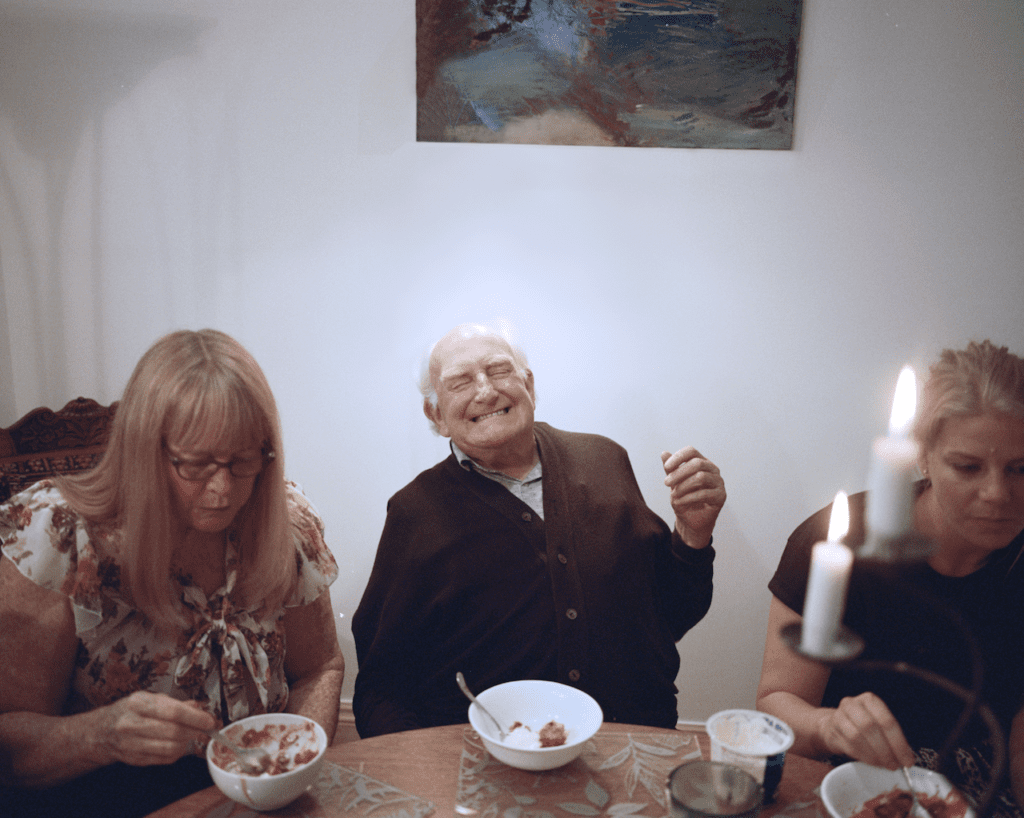 Karen and Jim Plummer, Rebecca Hammond – Beckenham, Kent. Jim Plummer sits at the table with three generations of his family. He plays with Sian, performing for the camera. Jim’s wife of 63 years died three years ago. He still lives in their home, and he misses her. When he first met Joyce, they were chaperoned as they walked together across the hill from church. “It is his wish that their ashes should, in time, be scattered over that hill,” Richard says. Jim now has dementia. Every weekend, Richard or his brother now drive a 150 mile round trip to stay and care for him, or bring him home to the rest of the family. © Sian Davey, text Tom Seymour
“I didn’t want people to position themselves around ideas of good or bad, or ethnicity, or gender. I just wanted people to get a sense of the whole,” adds Davey, who wanted the project to feel as inclusive as possible.
Karen and Jim Plummer, Rebecca Hammond – Beckenham, Kent. Jim Plummer sits at the table with three generations of his family. He plays with Sian, performing for the camera. Jim’s wife of 63 years died three years ago. He still lives in their home, and he misses her. When he first met Joyce, they were chaperoned as they walked together across the hill from church. “It is his wish that their ashes should, in time, be scattered over that hill,” Richard says. Jim now has dementia. Every weekend, Richard or his brother now drive a 150 mile round trip to stay and care for him, or bring him home to the rest of the family. © Sian Davey, text Tom Seymour
“I didn’t want people to position themselves around ideas of good or bad, or ethnicity, or gender. I just wanted people to get a sense of the whole,” adds Davey, who wanted the project to feel as inclusive as possible.
Still adjusting to the latest change in her family life, Davey explains how it was her own daughter Alice who sparked this exploration as she learnt to cope with the separation of her mother and father. “When my partner and I separated last year, [Alice] would just name each one of us and embrace us and incant the word ‘together’.
“That kind of got me thinking about how that feels. As a psychotherapist, the key issue that drives people into therapy is loneliness and separation. So what she articulated very coherently is that when we’re together, we’re at peace.”
The photographer now hopes to explore more family relationships across different cultures, as she travels to display her exhibitions. At the end of the year, she will be in Budapest and aims to shoot more family meals in the Hungarian capital.
“In that moment [of photographing] you’re creating a microcosm for their histories that have come together. That tells you everything you need to know about who they are and how they relate to each other. We’re seeing a psychological moment, these moments of psychological dynamics being negotiated in each family.”
https://www.siandavey.com/ Together is on display at the National Portrait Gallery from 20 September-04 October, before starting an international tour. The series features as a pop-up exhibition as part of the McCain ‘We Are Family’ series which celebrates British families in all their shapes and sizes. For more information, head to the McCain Facebook page – https://www.facebook.com/
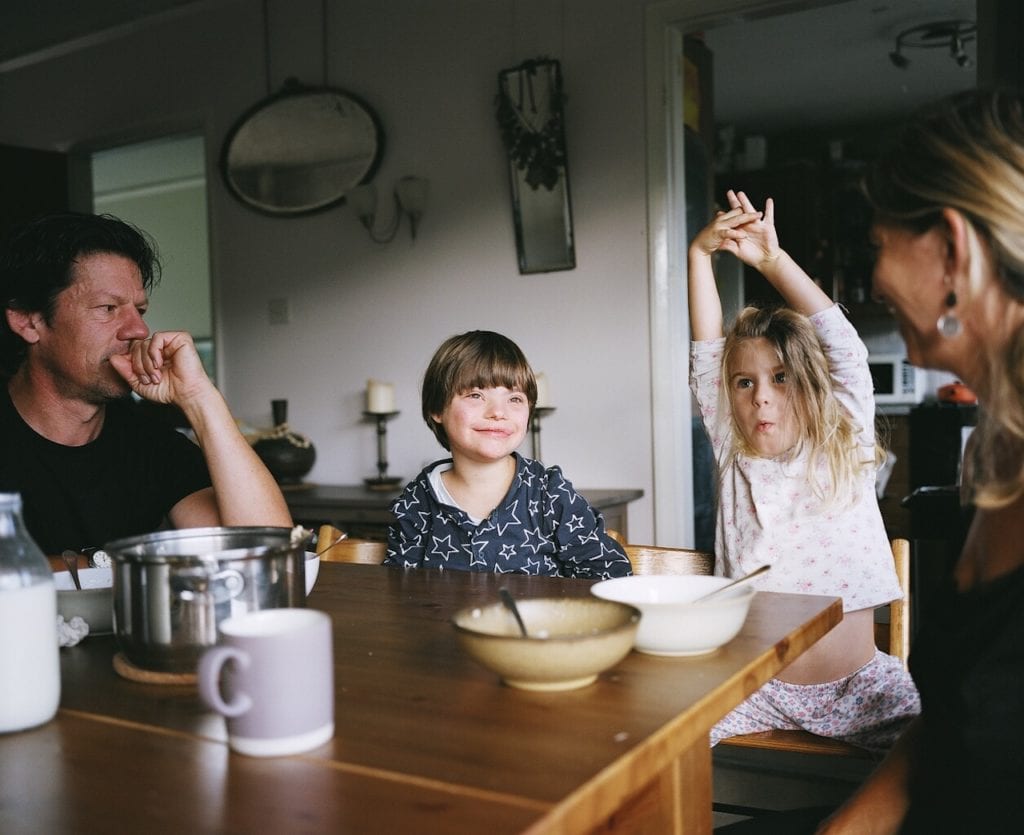 Tom, Billy, Mila Wigston and Anna Durrant – Buckfastleigh, Devon. After past marriages, Tom and Anna met through friends. “We just had a feeling we were meant to be together,” Tom says. Billy, their son, was born eight years ago with Down’s Syndrome. He has suffered life-threatening seizures throughout his life. They bought this home in Devon to suit his needs. Mila, his sister, is four years younger. More than anyone, she instinctively knows how he feels, how to read his want and needs. For much of his life, Billy has struggled with physical contact. Now he reaches out to embrace his mother. “I didn’t realise how much I needed it,” she says. Billy’s wellbeing encompasses many of the family’s decisions. “As a family, we face daily challenges. We’re often restricted in the things we do,” Tom says. “But a new way of being has opened up for us.” © Sian Davey, text Tom Seymour
Tom, Billy, Mila Wigston and Anna Durrant – Buckfastleigh, Devon. After past marriages, Tom and Anna met through friends. “We just had a feeling we were meant to be together,” Tom says. Billy, their son, was born eight years ago with Down’s Syndrome. He has suffered life-threatening seizures throughout his life. They bought this home in Devon to suit his needs. Mila, his sister, is four years younger. More than anyone, she instinctively knows how he feels, how to read his want and needs. For much of his life, Billy has struggled with physical contact. Now he reaches out to embrace his mother. “I didn’t realise how much I needed it,” she says. Billy’s wellbeing encompasses many of the family’s decisions. “As a family, we face daily challenges. We’re often restricted in the things we do,” Tom says. “But a new way of being has opened up for us.” © Sian Davey, text Tom Seymour
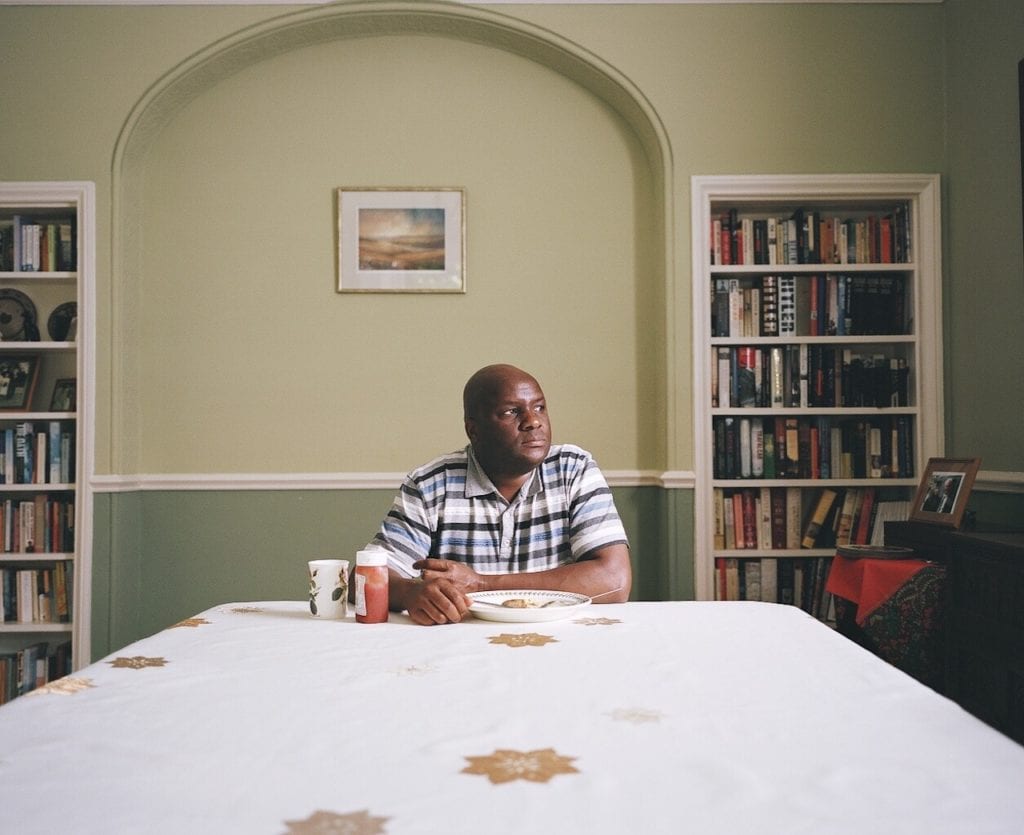 Chishamiso Mkundi – Harare/Sheffield. Chishamiso Mkundi grew up on a farm in Zimbabwe. At 14, he left for Harare. There, he studied to be an engineer, married, and had three sons and a daughter. “My eldest son is 24 and my youngest is 17,” he says. “I last saw them 15 years ago.” Chishamiso is an asylum seeker with leave to remain. But his status as a refugee remains undetermined. He is caught in a no-man’s-land. “I have no legal rights to stay in the country,” he says. “I am reliant on goodwill.” As a young man, Chishamiso joined a political party that opposed President Robert Mugabe. “My presence in Zimbabwe threatened my family,” he says. “By leaving, I protected them.” When he first arrived in Sheffield, Chishamiso relied on ASSIST, a voluntary organisation operating out of the city’s Methodist church. He would sleep in the church at night, and now stays in the homes of local families willing to take him in. He works in an Oxfam shop, helps run a food bank, and plays the tuba in a local brass band. Chishamiso’s family remain in Zimbabwe. “But being amongst other families helps me,” he says. “It makes me feel part of this country.” © Sian Davey, text Tom Seymour
Chishamiso Mkundi – Harare/Sheffield. Chishamiso Mkundi grew up on a farm in Zimbabwe. At 14, he left for Harare. There, he studied to be an engineer, married, and had three sons and a daughter. “My eldest son is 24 and my youngest is 17,” he says. “I last saw them 15 years ago.” Chishamiso is an asylum seeker with leave to remain. But his status as a refugee remains undetermined. He is caught in a no-man’s-land. “I have no legal rights to stay in the country,” he says. “I am reliant on goodwill.” As a young man, Chishamiso joined a political party that opposed President Robert Mugabe. “My presence in Zimbabwe threatened my family,” he says. “By leaving, I protected them.” When he first arrived in Sheffield, Chishamiso relied on ASSIST, a voluntary organisation operating out of the city’s Methodist church. He would sleep in the church at night, and now stays in the homes of local families willing to take him in. He works in an Oxfam shop, helps run a food bank, and plays the tuba in a local brass band. Chishamiso’s family remain in Zimbabwe. “But being amongst other families helps me,” he says. “It makes me feel part of this country.” © Sian Davey, text Tom Seymour
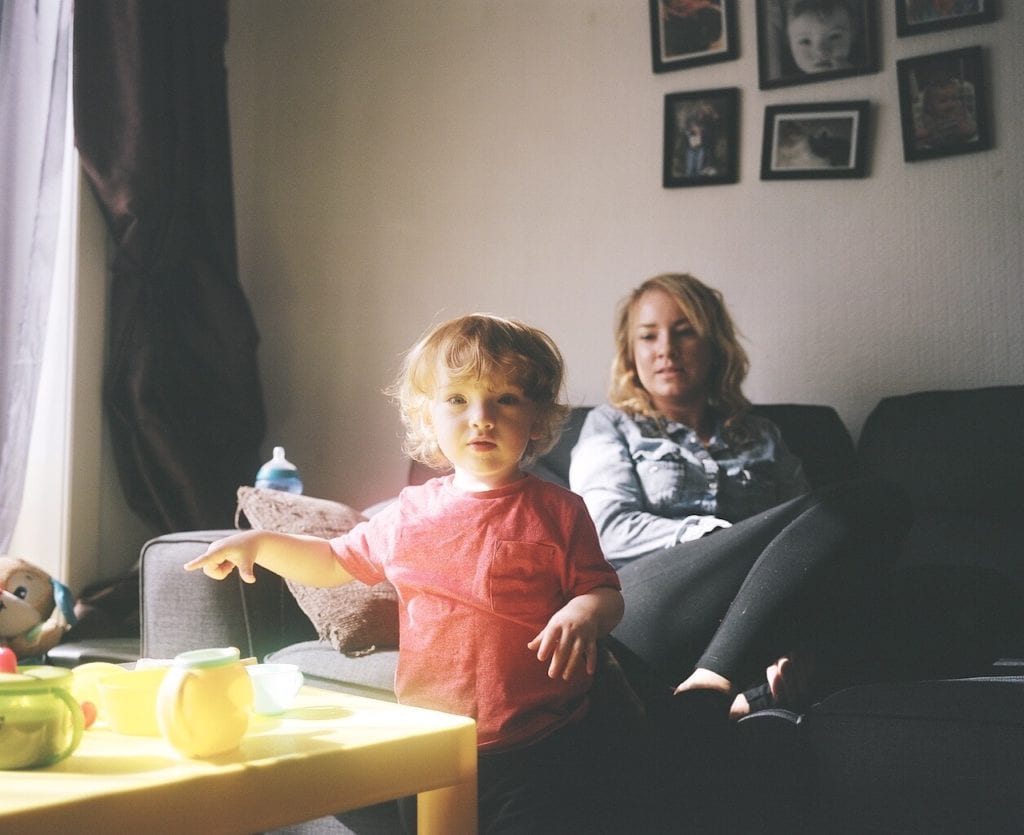 Sebastian and Christina McIntosh – Benbecula, Outer Hebrides. Christina was born on Benbecula, one of the most isolated communities in the UK. She lives with Sebastian in a hamlet near the sea. Further down the track, you can find her mother and brother Derek, who runs the family croft. Two younger brothers and a younger sister have left for the mainland, but she’s chosen to stay. “Derek cares more about his animals,” she says. “And he always gets presents for our mum.” But when he falls ill, Christina is the first to look after him.
Sebastian and Christina McIntosh – Benbecula, Outer Hebrides. Christina was born on Benbecula, one of the most isolated communities in the UK. She lives with Sebastian in a hamlet near the sea. Further down the track, you can find her mother and brother Derek, who runs the family croft. Two younger brothers and a younger sister have left for the mainland, but she’s chosen to stay. “Derek cares more about his animals,” she says. “And he always gets presents for our mum.” But when he falls ill, Christina is the first to look after him.
She works as a cashier in the island’s supermarket, and in the evenings as a chef at the local hotel. While she works, Sebastian is looked after by his grandma. “He’s a funny wee boy,” she says. “We’re content,” she says. “We love to be together.” © Sian Davey, text Tom Seymour









